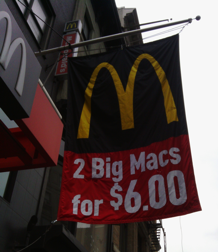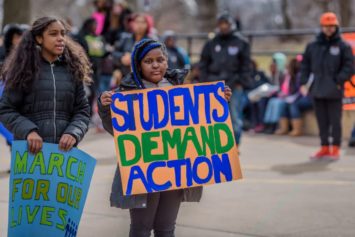Fast food franchises appear suddenly in Black communities like a jack-out-of-a-box, occupying corners close to houses, schools and malls. These franchises function as pimps, pasting seductive images of fast food on windows to grab the attention of those passing by and ignite hunger pangs in residents who are too weak or defeated to demand anything better.
Franchises function as money-making machines, growing exponentially within Black communities, serving junk disguised as food. This junk triggers chronic, irreversible diseases such as diabetes and heart disease; these diseases are left to run through Black bodies like electricity at night.
It seems fast food has become the “McMighty” killer of Black people, but their deaths are insignificant because driving up profits is more important than Black lives. Generating cash to fund holidays, cars and lavish homes happens at the expense of Black life. And Black life has always been used to maximize profit. Essentially, it was the labor of Black slaves that enabled America to accumulate an unprecedented amount of wealth, and today building wealth just sings a different tune.
While living in the Flatbush area of Brooklyn, New York — an area with a large population of Black immigrants and African-Americans — I was duped into thinking it was cheaper to eat fast food. I grabbed a burger on my way to class and sipped on sugar-packed mocha lattes as I scribbled down lecture notes. Everywhere I turned there were “lunch specials” offering “free sodas” or the chance to “supersize” my meal. I was cornered into a schedule of fast food reinforcement, which operated within the iceberg of my unconscious mind. Of course, there were a few Caribbean restaurants offering authentic dishes that corresponded to homemade meals, but these dishes were often more expensive than fast food.

While living in Flatbush, I was locked in a food apartheid: my body ballooned, my energy waned, and my health began to deteriorate. Often, meals were not a fun pastime; instead they were tortuous, messy affairs in which I rushed through the uncomfortable ordeal hoping that the fizz in the soda would wash down the grease. Clearly, I was making bad choices and lost in a fog of fast food abuse; burgers wrapped in paper became my only solace.
I soon realized that I had to leave Flatbush before fast food killed me.
But escaping food apartheid isn’t easy. Many neighborhoods carry an invisible “white people only” label, and often it is these neighborhoods that have organic grocery stores and farmers’ markets. Moving into a different neighborhood becomes a battle with landlords, who have money falling out of their ears, but still demand the first and last month’s rent, and an additional month’s rent as a security deposit. Consequently, moving costs thousands of dollars, and for someone living from paycheck to paycheck, escaping to a new neighborhood becomes a distant dream. Inevitably, people become incarcerated in a monstrous fast food playground in which the ride never ends and eventually induces nausea, disease and death.
As a Black British-Ghanaian, I’ve compared the food I was exposed to growing up in Stratford, London, England, to the food that was available to me in Flatbush, Brooklyn — the substantial difference in the quality of food is heart-wrenching. When it comes to meeting the needs of the poor through food, the bar is set far higher by the British.
This is not to say that malnourishment and poverty does not affect communities in the U.K. The U.K. is not without its problems: back in 2013, horse meat was found in school dinners and hospital meals. But even with these problems, poor people in the U.K. are treated with greater respect and dignity when it comes to the accessibility of good food, compared to poor people in America.
And food that would be placed in the garbage in British supermarkets is allowed to be sold in grocery stores in Black communities.
In Flatbush, the disregard for Black health was shown by mold on blackberries and the abundance of vegetables that were wilted and discolored. Indeed, racism lived in the cracks and holes of mediocre food.
My departure from Flatbush symbolized the development of an enriched and analytical consciousness, and with this the brutal reality of food apartheid slammed into me like a truck in the dark. With this new mindset, I chose to consume better food and wondered whether America had a conscience. I questioned whether I had made the right decision about moving to America in the first place because there is something unappealing about raising children in a country that doesn’t look after its own.
The body is linked to the mind, and a healthy, functioning mind is also dependent on a nourished body. With a foggy mind, one cannot be productive, develop intellectually and challenge the status quo. Bad food helps to keep hearts and minds weak, and people in a malleable state of submissiveness.
The Black Panthers understood the connection between nutrition and academic performance, or the mind-body connection, and it was this understanding, among other things, that drove them to create The Free Breakfast Program, a revolutionary program that provided breakfast for poor Black children. Today, we see Black children are targeted by fast food franchises, whose logic lies in the belief that if you “get them while they’re young” they will be lifelong consumers of bad food.
Just like drugs destroyed Black communities and Black minds to eradicate the intellectuals orchestrating the civil rights movement, bad food also functions as a killer and an intellectual sap. And let’s not forget that some of these foods are addictive, thereby serving the same debilitating function as drugs.
The inhumanity of food apartheid is lodged in the acceptance of capitalism. So perhaps it’s not “our” food that’s killing us, but the food transplanted into our communities by capitalist crusaders.
Within our communities there are individuals and groups who are conscious about what they consume and offer alternatives to fast food. The Food Project based in Boston is doing important work exposing families to the value associated with growing their own food, and accessing fresh produce from farmers’ markets. In New York City, teenagers with Youth Ministers for Peace and Justice (YMPJ) installed a green roof. The green roof was designed to grow vegetables, flowers and herbs as a means to retain water. Further, the Backyard Gardeners Network based in the Lower 9th Ward in New Orleans is using food growing traditions to establish community and energize the neighborhood.
In addition, there are many among us who demonstrate that conscious eating can be a way of life. Rastafarians, for example, follow a specific diet defined by a preference for foods occurring in their natural state, and the consumption of foods that promote good health. Rastafarians avoid foods that have chemicals or additives in them. Finally, many among us are skilled in the art of cooking, and through cooking meals one can assume greater control of one’s diet.
But these alternatives do not eliminate the need for the destruction of food apartheid, they simply show us that by turning to the skills and knowledge within our communities, change is possible.
Jacqueline Bediako is a writer, teacher and activist currently living in Brooklyn, New York. She describes herself as a Black British-Ghanaian, and has called New York City home for the past seven years. Jacqueline’s work focuses on race, politics, immigration, and the education of students with disabilities. Follow her @jb2721.


